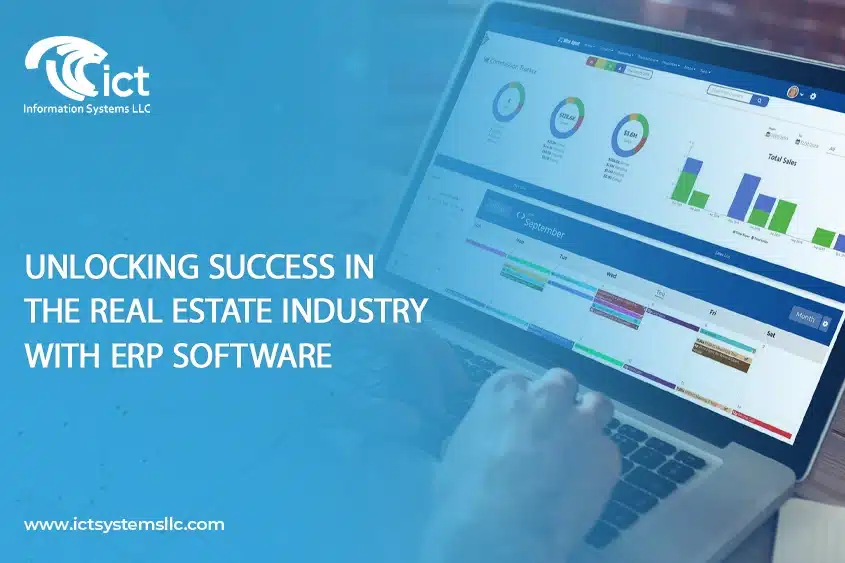In today’s rapidly growing real estate industry, staying ahead of the competition is crucial for business owners. Embracing technological advancements and streamlining business processes can be the key to becoming a top realtor. One powerful solution to achieve this is the adoption of ERP (Enterprise Resource Planning) software. In this article, we will delve into the world of real estate, explore the functions and challenges faced by the industry, understand what ERP is, discuss As-Is Process Analysis, highlight the benefits of ERP in real estate, provide tips for choosing the right ERP Real Estate software, explore global trends in the real estate sector for 2024, and introduce how Our ERP Real Estate Software can assist you on your journey to success.
What is Real Estate?
Real estate is a dynamic and multifaceted industry that involves the buying, selling, renting, and managing of properties. This sector encompasses a wide range of property types, including residential, commercial, industrial, and agricultural, making it a pivotal component of the global economy.
Functions in the Real Estate Industry
The real estate industry comprises various functions, each serving a unique purpose:
Property Development:
Property development involves the planning, design, and construction of properties. It encompasses everything from residential housing projects to large-scale commercial developments.
Property Management:
System management in Property can focuses on overseeing, maintaining, and maximizing the value of properties. Property managers are responsible for ensuring that properties are well-maintained, tenants are satisfied, and rental income is optimized.
Property Sales and Marketing:
Sales marketing in Property involve promoting and selling properties to potential buyers or renters. This function includes creating appealing property listings, conducting property tours, and negotiating deals.
Real Estate Finance:
Real estate finance deals with securing financing for property purchases, managing real estate investments, and handling financial transactions related to properties. This function is critical for both individual buyers and real estate investors.
Real Estate Appraisal:
Real estate appraisal determines the value of properties for various purposes, such as sales, mortgages, or taxation. Appraisers use a combination of market data, property inspections, and valuation methods to assess property values accurately.
Duties of a Real Estate Agent
Real estate agents play a pivotal role in property transactions. Their responsibilities include:
Property Listings:
Real estate agents are responsible for creating and managing property listings for sale or rent. They must accurately represent the properties, including their features, condition, and pricing.
Client Representation:
Real estate agents represent clients, whether they are buyers or sellers, throughout the buying or selling process. They act as advocates for their client’s interests and work to achieve the best possible outcomes.
Market Analysis:
Providing clients with market insights and property valuations is a crucial duty of real estate agents. They help clients understand market trends, property values, and potential investment opportunities.
Negotiation:
Real estate agents are skilled negotiators who handle deals, offers, and contracts on behalf of their clients. Negotiation is a critical aspect of achieving favorable terms in real estate transactions.
Legal Compliance:
Ensuring that all transactions adhere to legal regulations and standards is paramount. Real estate agents must have a solid understanding of local, state, and national real estate laws to protect their clients’ interests.
Challenges Faced by the Real Estate Industry
Despite its potential for lucrative returns, the real estate industry also faces several challenges:
Market Volatility:
Real estate markets can experience significant fluctuations, impacting property values. Factors such as economic conditions, interest rates, and geopolitical events can influence market stability.
Regulatory Changes:
Evolving regulations at the local, state, and federal levels can affect property transactions and financing. Staying up-to-date with legal requirements is essential to avoid legal complications.
Competition:
The real estate industry is highly competitive, with numerous realtors vying for clients and properties. This competition demands innovation, exceptional service, and efficiency to stand out.
Data Management:
The real estate sector deals with vast amounts of property data, including property details, market data, and client information. Efficiently managing this data and using it effectively for decision-making can be a challenge.
What is ERP in Real State Business?
Enterprise Resource Planning (ERP) is a comprehensive software system designed to streamline and integrate various business processes within an organization. It serves as a centralized hub for managing everything from finance and human resources to inventory and customer relationships. ERP software is known for its ability to connect different departments and functions, allowing for a holistic view of business operations.
As-Is Process Analysis
Before implementing ERP, it’s essential to conduct an As-Is Process Analysis. This involves:
Identifying Current Processes:
Understanding existing workflows and operations is the first step. This includes documenting how different departments handle tasks and data.
Documenting Pain Points:
Recognizing inefficiencies and challenges within the current processes is crucial. This could include redundant tasks, data silos, manual data entry, and communication bottlenecks.
Setting Objectives:
Based on the analysis of current processes, clear objectives should be established. These objectives should outline what the organization aims to achieve with ERP implementation, such as improving efficiency, data accuracy, and decision-making.
Mapping Future Processes:
After identifying weaknesses and setting objectives, the next step is to design improved processes with ERP integration. This involves defining how different departments will work together seamlessly with the new ERP system.
How to Get Where You Want to Be with As-Is Process Analysis?
As-Is Process Analysis is a critical step that lays the foundation for ERP success. By identifying weaknesses and setting objectives, you can align ERP implementation with your business’s unique needs. This ensures a smoother transition and maximizes the benefits of ERP adoption.
Benefits of ERP in the Real Estate Industry
ERP software offers several advantages to real estate businesses, including:
Efficiency:
ERP streamlines operations, reducing manual tasks and errors. This efficiency translates to time and cost savings.
Data Centralization:
ERP provides a single source of truth for all business data. This eliminates data silos and ensures data accuracy and consistency.
Improved Decision-Making:
With real-time data and analytics, ERP enables informed decision-making. Realtors can access insights into market trends, client preferences, and financial performance.
Enhanced Customer Experience:
ERP allows for better client management and communication. Realtors can track client interactions, preferences, and history to provide personalized service.
Scalability:
ERP systems are designed to adapt to business growth and evolving needs. Whether you’re expanding your real estate portfolio or adding new services, ERP can scale with you.
Tips to Pick the Right ERP Software for the Real Estate Industry
When selecting an ERP solution for your real estate business, consider these tips:
Customization:
Ensure the ERP can be tailored to your specific processes. Real estate businesses have unique workflows, so flexibility is crucial.
User-Friendly Interface:
Options for software that is easy to use for your team. User adoption is key to maximizing the benefits of ERP.
Scalability:
Choose a solution that can grow with your business. Look for scalability features that can accommodate your expansion plans.
Integration:
Check for compatibility with existing tools and software. Your ERP should seamlessly integrate with other systems you use, such as accounting software or customer relationship management (CRM) tools.
Support and Training:
Ensure the ERP provider offers adequate support and training. Comprehensive training can help your team make the most of the ERP system.
Global Trends in the Real Estate Industry in 2022
In 2022, the real estate industry is witnessing key trends:
Digital Transformation:
Embracing technology for virtual tours, online transactions, and data analytics. Realtors are leveraging digital tools to provide immersive property experiences.
Sustainability:
Increasing focus on eco-friendly and energy-efficient properties. Green building practices and sustainability certifications are becoming more common.
Remote Work Impact:
Shifts in property preferences due to remote work opportunities. Properties with home office spaces and better connectivity are in demand.
Smart Homes:
Growing demand for connected homes and IoT (Internet of Things) devices. Buyers are looking for properties with smart features for convenience and security.
Global Investment:
Cross-border property investments are on the rise. Investors are diversifying their portfolios by exploring international real estate markets.
How Can Our ERP Real Estate Software Assist You?
Our ERP Real Estate Software offers a comprehensive ERP solution tailored to the real estate industry. With Our ERP Real Estate Software, you can:
Automate Processes:
Streamline property management, sales, and finance operations. Tasks such as lease management, rent collection, and financial reporting can be automated for efficiency.
Centralize Data:
Maintain a centralized repository of property and client information. Easily access property details, lease agreements, and client communications in one place.
Enhance Communication:
Improve client interactions and collaboration within your team. Our ERP Real Estate Software module helps you manage client relationships effectively.
Gain Insights:
Make data-driven decisions with real-time analytics. Monitor property performance, track expenses, and forecast market trends.
Scale Your Business:
Adapt to growth and changing market dynamics seamlessly. Our ERP Real Estate Software’s scalability ensures that your ERP system can evolve with your real estate business.
Get the Best ERP System with Our ERP Real Estate Software
To unlock the full potential of your real estate business, try Our ERP Real Estate Software’s ERP system for free today. Elevate your efficiency, enhance client relationships, and stay ahead in the dynamic world of real estate.
About ICT Information Systems LLC
ICT Information Systems LLC is one of the leading ERP software providers in the real estate industry with a rich history of providing innovative solutions to our clients. With our extensive expertise and commitment to excellence, we have consistently delivered exceptional results in property development, management, sales, and finance. Our partnership with Our ERP Real Estate Software allows us to offer cutting-edge Webdesk ERP solutions tailored to the unique needs of the real estate sector.
Feel free to adapt and expand upon this content as needed to align it with your company’s messaging and objectives. This comprehensive article provides a detailed overview of ERP’s role in the real estate industry and how Our ERP Real Estate Software in Dubai can assist your business in achieving success.








































